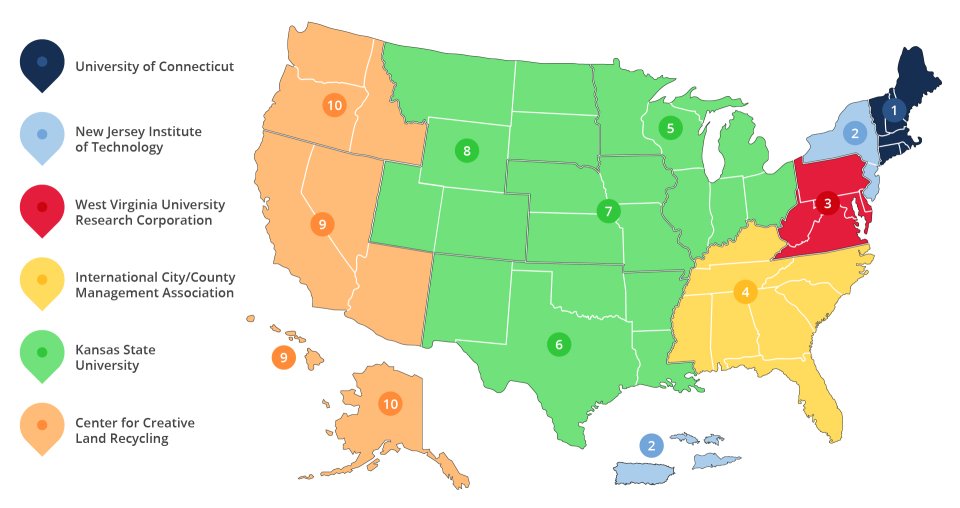
EPA provides several types of free technical assistance to support local efforts to address brownfield sites:
Also see these additional resources available to assist organizations with their brownfields projects.
The Technical Assistance to Brownfields Communities (pdf) (995.2 KB) Program provides technical assistance to communities, states, Tribal Nations and other public entities to help address their brownfield sites and to increase their understanding and involvement in brownfields cleanup, revitalization and reuse. The program supplements other efforts under the Brownfields Program.
TAB is available at no cost to communities. EPA funds regionally based expert organizations to support communities in each of its 10 regions. TAB grant recipients, also known as TAB providers, serve as an independent resource and can provide expert technical assistance and guidance to help communities, among other things, understand how to:
Any community with a brownfields concern can reach out to their regional TAB provider for assistance. For general inquiries, contact a brownfields representative in your EPA regional office.
EPA Region 1
University of Connecticut
EPA Region 2
New Jersey Institute of Technology (NJIT)
EPA Region 3
West Virginia University Research Corporation
EPA Region 4
International City/County Management Association
New Jersey Institute of Technology (NJIT)
EPA Regions 5, 6, 7 and 8
Kansas State University
EPA Regions 9 and 10
Center for Creative Land Recycling (CCLR)

EPA funds a variety of nationwide expert organizations to assist communities with brownfields issues. Technical assistance is available at no cost to communities. Providers include:
Communities may reach out directly to the organizations above for free brownfields technical assistance.
Learn More
EPA’s Targeted Brownfields Assessment (TBA) program helps communities understand potential contamination at a brownfield site and plan for cleanup and redevelopment. The program supplements other efforts under the Brownfields Program and provides assistance at no cost to communities. An EPA contractor delivers TBA assistance on behalf of an eligible entity. Services include the following:
Specific activities may include the following:
EPA offers TBA to public entities (e.g., municipalities, regional planning commissions) and nonprofit organizations that already have redevelopment plans for a contaminated property. They can apply on behalf of a specific site they currently own or can become owners through other means (e.g., tax foreclosure).
Sites not owned by applicants may be eligible if they are abandoned: the site owner has shown no interest in the property, has not paid taxes on the property and does not have the resources for the required site assessment.
Private parties are not eligible for assistance in assessing and cleaning up sites for redevelopment.
TBA is available directly through EPA regional offices or from State and Tribal Voluntary Response Program offices receiving funding. Sites are selected on a rolling basis.
Contact a brownfields representative in your EPA regional office to learn more.
EPA's Land Revitalization Technical Assistance (LR TA) can help a community determine which types of brownfield site reuses are feasible, given local conditions (e.g., economic, infrastructure, social, climate and environmental site conditions), infrastructure availability, community site design preferences, and funding or financing resources. Understanding the community's goals for site reuse is an important part of making local decisions around how to assess, remediate and safely reuse the brownfield.
LR TA typically supplements brownfields grants and other technical assistance provided under the Brownfields Program. An EPA contractor delivers the LR TA support at no cost to communities.
LR TA can help a community navigate many of the site reuse challenges posed by brownfield sites. While land revitalization looks different in every community, many brownfields reuse planning activities can be supported through LR TA, including:
As resources allow, EPA's Regional Brownfields and Land Revitalization Programs can connect communities with LR TA support. Individuals and private, for-profit organizations are not eligible to receive LR TA.
Contact a brownfields or land revitalization representative in your EPA regional office to learn more.
Section 128(a) TAG is provided to Section 128(a) cooperative agreement recipients so that they may provide technical assistance to small communities, Indian Tribes, rural areas or disadvantaged areas. By law, the maximum amount per Section 128(a) TAG is $20,000.
Uses for these funds include providing training, research, and technical assistance to facilitate the inventory of brownfield sites, site assessments, remediation of brownfield sites, community involvement or site preparation. See the Section 128(a) TAG Fact Sheet for more information.
Eligible entities for Section 128(a) TAG funding include:
The request must be on behalf of a(n):
Multiple eligible communities may be assisted in one grant.
Section 128(a) TAG is awarded as part of the annual CERCLA 128(a) State and Tribal Response program funding cycle. Appendix A of the annual grant funding guidance provides the specific instructions for requesting 128(a) TAG funds in a given fiscal year. Copies of the guidance can be obtained from EPA's State and Tribal Response Program Grants webpage. Requests must include the information listed in Appendix A of the guidance and be submitted to the appropriate Regional EPA Brownfields office by the stated deadline.
This general outline (7.6 MB) explains how to assess and clean up a brownfields site, including:
This road map (1.36 MB) helps EPA Brownfields Assessment Grant recipients design and complete site assessments more efficiently and effectively through quality assurance practices.
This resource provides information about hazardous waste remediation.
EPA has developed and identified a range of mapping and spatial tools that may be helpful to communities as they pursue land revitalization goals.